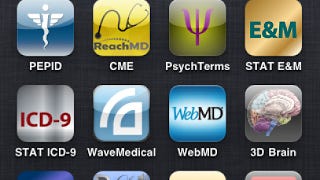Is anyone regulating phony medical apps for your smart phone?

When the iTunes store began offering apps that used cellphone light to cure acne, federal investigators knew that hucksters had found a new spot in cyberspace.
“We realized this could be a medium for mischief,” said James Prunty, a Federal Trade Commission attorney who helped pursue the government’s only cases against health-app developers last year, shutting down two acne apps.
Since then, the Food and Drug Administration has been mired in a debate over how to oversee these high-tech products, and government officials have not pursued any other app developers for making medically dubious claims. Now, both the iTunes store and the Google Play store are riddled with health apps that experts say do not work and in some cases could even endanger people.
These apps offer quick fixes for everything from flabby abs to alcoholism, and they promise relief from pain, stress, stuttering and even ringing in the ears. Many of these apps do not follow established medical guidelines, and few have been tested through the sort of clinical research that is standard for less new-fangled treatments sold by other means, a probe by the New England Center for Investigative Reporting based at Boston University has found. While some are free, thousands must be purchased, at prices ranging from 69 cents to $999.
Nearly 247 million mobile phone users are expected to download health apps in 2012, according to Research2Guidance, a global market research firm.
In an examination of 1,500 health apps that cost money and have been available since June 2011 , the center found that more than one out of five claims to treat or cure medical problems – exactly the sorts of apps that FDA-proposed guidelines suggest need regulation. Of the 331 therapeutic apps, nearly 43 percent relied on cellphone sound for treatments. Another dozen used the light of the cellphone, and two others used phone vibrations. Scientists say none of these methods could possibly work for the conditions in question.
“Virtually any app that claims it will cure someone of a disease, condition or mental health condition is bogus,” says John Grohol, an expert in online health technology, pointing out that the majority of available apps have not been scientifically tested. “Developers are just preying on people’s vulnerabilities.”
Satish Misra, a physician and the managing editor of the app review Web site iMedicalApps, adds: “They take some therapeutic method that is real – and in some cases experimental – and create a grossly simplified version of that therapy using the iPhone. Who knows? Maybe it works.” But until testing shows otherwise, “my feeling would be that it doesn’t.”
A few private groups, meanwhile, are working to assess the quality of various apps. Misra’s iMedicalApps gets health-care professionals to review software applications that mainly interest physicians. Happtique, a subsidiary of the Greater New York Hospital Association, is about to launch the nation’s first app certification service, which will evaluate apps for safety and effectiveness. It will award some apps the high-tech equivalent of the Good Housekeeping Seal of Approval. “We truly believe people need a trusted source,” said Ben Chodor, Happtique’s chief executive.
http://necir-bu.org/investigations/medical-apps/


